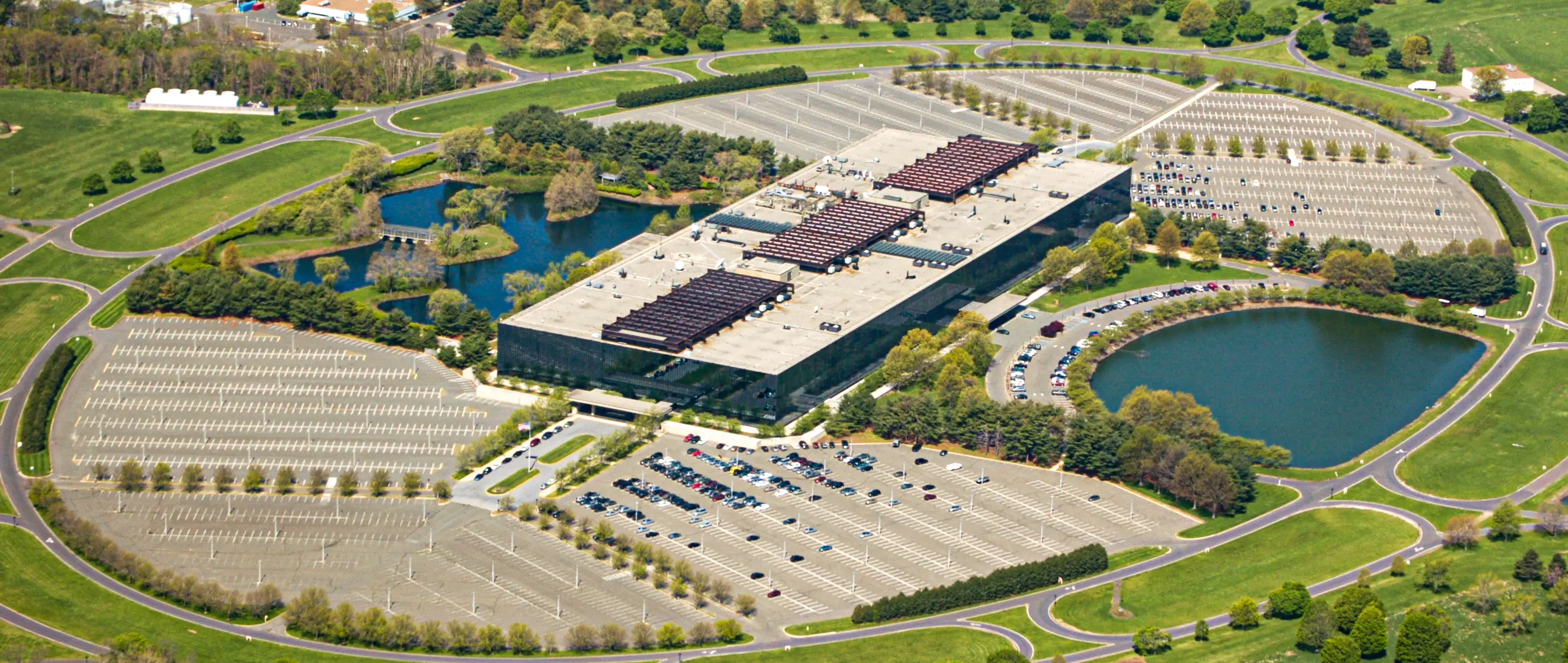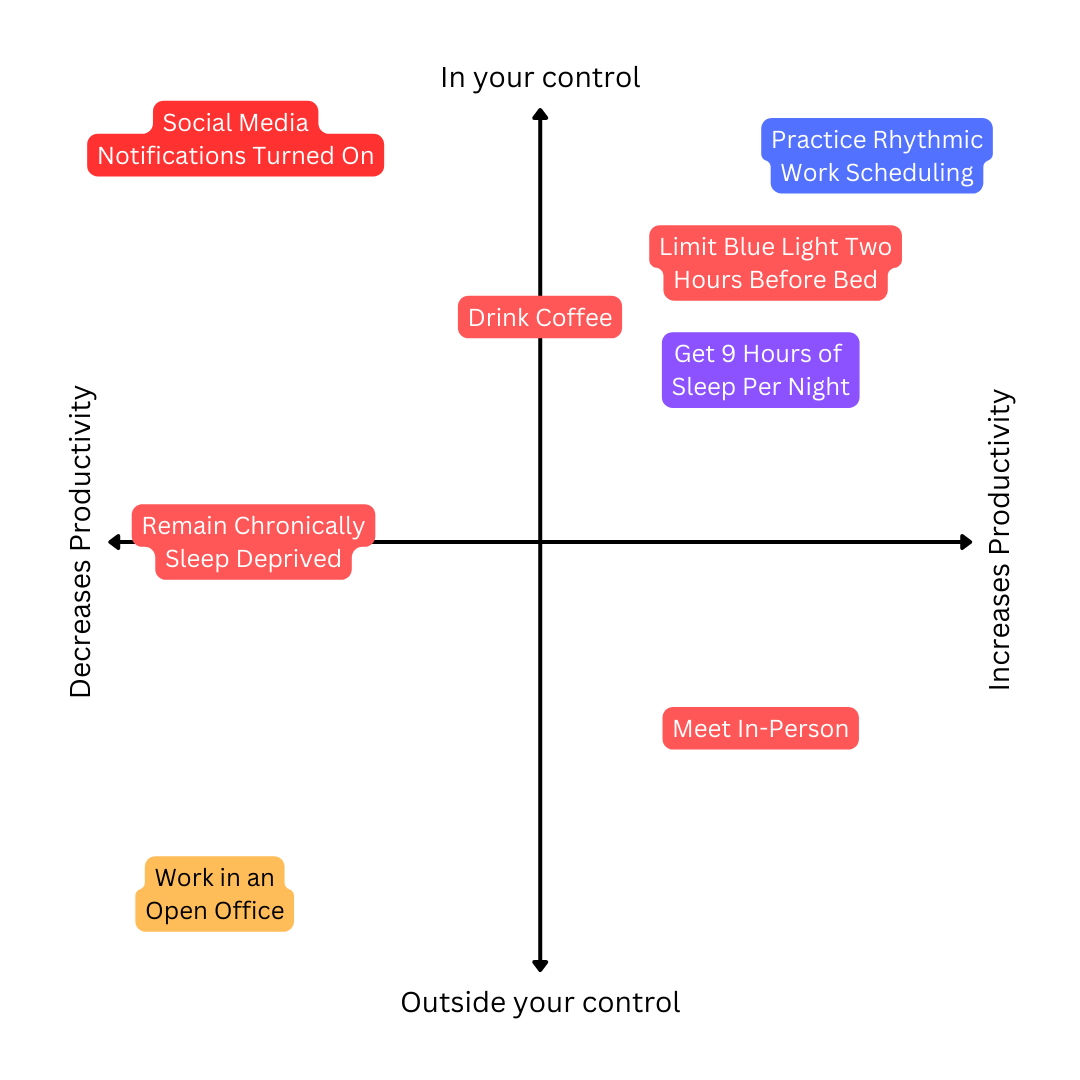The Optimal Workspace
There are a number of grand challenges my generation faces. Some threaten the way we live, like the housing crisis. Others are difficult to solve, like space travel. More still both threaten the way we live and are difficult to tackle, like climate change and pollution.
But of all the discussion of the problems of the modern world, one is often overlooked: how do we live happier, more meaningful lives.
I've found that there are two main potential answers which involve the way we sleep and the way we work. They are related to the ongoing brain damage of millions of Americans, social media and lighting. By attempting to solve this problem (that of happiness and productivity), all other grand challenges become easier to solve.
Unlike other grand challenges, like space travel, whose solutions lie in the hands of relatively few scientists and administrators, this problem of how to live well is the responsibility of both individuals and businesses.
Step 1: Sleep

As a high school student, I had an adversarial relationship with sleep. The way I saw it, every minute asleep was a minute of homework not done, a minute of friendship not cherished. A minute of life lost.
I went many nights completely forgoing it entirely, believing that it was merely a preview of death. In hindsight, I think it reflects well on my work ethic, but poorly on my work technique. The ancient Greeks seemed to agree with me. According to them, god of sleep was Hypnos, twin brother of death.
I couldn't have been more wrong, for sleep is incredibly important. In fact, I may have received mild brain damage for my decisions. Sleep is not mere lack of activity. In the book Why We Sleep by Matthew Walker, he discusses why sleep is critical for living a life containing depth of work and depth of being.
There are two types of sleep, and each are equally important.
NREM (Non-Rapid Eye Movement) Sleep
NREM sleep is critical in the integration and solidification of memory. This is the portion of sleep where your eyes are stationary, thus the name. In fact, NREM sleep seems to be the only time the brain actively works to retain memory. Since NREM sleep is more prevalent in the earlier hours of the night, going to bed two hours hours later than usual results in a 70% reduction in retention of factual information the next day.
REM Sleep
REM sleep is pivotal in creative thinking and emotional processing.
Walker models ideas as a knowledge graph. During wakefulness, traversal across this graph for the purpose of problem solving is somewhat isolated. In other words, people who are awake are only thinking of solutions or making connections that are conceptually similar to the existing solutions and ideas. During REM sleep, however, the brain makes finds longer-distances relationships, from much further-apart sections of the graph.
PTSD patients always have poor quality sleep from to nightmares. It isn't just a correlation, it is literally required in the diagnosis. Walker claims this is because the brain is attempting to process the negative emotions associated with trauma, but, since the emotions are so strong, wakes itself up. One of the main goals with cognitive behavioral therapy for PTSD patients is get the victim through a full night of sleep. By giving the brain the opportunity to properly process the negative experience (in REM sleep), they are able to dramatically speed up recovery.
Main takeaway: sleep more and you will live a longer, healthier, more impactful life.
The need for sleep varies across your lifetime less than many people think. The most desperate need is during infancy, with babies and toddlers requiring as much as 18 hours of sleep per day. As you get older, decreases until leveling off at eight and half hours of time in bed. No, that is not time asleep it is time in bed. It is a myth that seniors require less sleep. In truth, they require just as much sleep as in middle age, but have greater difficulty achieving it. This is primarily due to the correlated difficulty breathing, and secondarily due to the earlier bed-time seniors require.
There are a number of traits of the modern world that have resulting in the WHO diagnosis of sleep deprivation as a pandemic. More than 28% of Americans are chronically sleep deprived.
The Danger of Sleep Deprivation
Chronic sleep deprivation can result in brain damage. While you are awake, the glymphatic system (which is similar in function, different in implementation to the lymphatic system) is inactive. As a result, there is a gradual buildup of garbage in the brain, blocking neurotransmitters and generally disrupting the ability for neurons to communicate with each other. One protein that builds up: beta amyloid, the same protein that causes Alzheimer's disease. When you sleep, the glymph system starts up and cleans up the garbage wakefulness accumulated. However, if not given enough time to do its work (by sleeping), the glymphatic system is not able to do its job entirely. This is why your likelihood of getting Alzheimers increases the less you sleep.
Sleep deprivation also causes increased concentrations of cannabinoids. Just like Marijuana, these increases appetite for unhealthy foods. Additionally, sleep is an energy intensive process. The body burns more calories at night during sleep than during harmful wakefulness. All in all, there is a very strong connection between sleep deprivation and obesity.
Matthew Walker highlights one especially critical time when physical and mental health (especially memory retention) are important: school. The primary goal of school is to learn, to which NREM sleep is critical (due to its role in memory retention).
Starting in middle school, children's circadian rhythms start to shift later. In other words, teenagers naturally fall asleep and wake up later than other age groups. Walker attributes this to the need for teens to become more independent. Evolution pushes them to operate by themselves by forcing their parents to go to bed earlier.
Schools operate under the circadian rhythms of parents and teachers. 7 o'clock in the morning is the ideal time for them, but not for the students. But we find that students don't go to bed any earlier, even though they are forced to awake at the same time as their parents. The end result: millions of middle and high school students are currently experiencing chronic sleep deprivation, just because school starts too early.
The eating and physical habits developed during one's school years serve as the template for the remainder of their lives. If one spends their developing years under sleep deprivation (which is the case for millions of students in the U.S.) they are learning how to live their life under the influence of cannabinoids, all the while getting gradual brain damage from the buildup of beta amyloid.
Sleeping Pills
As an aside, I feel the need to address sleeping pills. Do not take them.
There are currently no medications on the market that induce real sleep. There are medications that slow and stop brain function, like Ambien. They do not provide real sleep, and as such do not result in memory integration, emotional processing or any of the other benefits of sleep. In fact, studies with Ambien show that induced "sleep" actually results in a net loss of memory, compared with not sleeping at all. Not only does Ambien stop natural memory integration, it actively causes forgetfulness.
Phones and Blue LEDs

The part of the brain that runs your circadian rhythm is called the superchiasmatic nucleus. This is an extremely small cluster of neurons that sits on the intersection of your two optic nerves. It watches for signals of blue light. If is any is detected (since the only significant, natural blue is from the sky) it can safely assume it is day and will slowly adjust itself under that assumption.
Phones and other sources of blue light mess with this process. If your eyes detected any at night, you are guaranteed to sleep worse.
There are other neurological effects at play. Most activities that take place on a phone activate the part of the brain called the amygdala, which we most commonly associate with the fight or flight response. When activated, your body prepares itself for survival. It slows or halts digestion, dilates the pupils and increases metabolism. In other words, prepares your body for action, not rest.
The issue: one of the most commons staples of modern office spaces are the rows upon rows of florescent lights. All people working in buildings outfitted with these lights may be experiencing worst quality and quantity of sleep as a result, especially those working later or longer hours.
In the search for producing deep work and living a full life, getting enough sleep is paramount. It is the single most effective move one can make, since it makes all other actions more effective.
However, as I previously pointed out, success in the new economy relies particularly on deep work, which requires deep focus.
Step 2: Deep Focus
At the beginning, I mentioned there are two problems restricting the ability for people to live happy, effective lives. The first was related to sleep, the second was related to deep focus.
Before I can explain how to achieve deep focus (according to Cal Newport), I first need to explain why it is so critical.
The Information Age

We like to separate history into ages. The age of the dinosaurs was followed by the ice age which was followed by the human age (the Anthropocene). Granted, that's an oversimplification, but it highlights the point: we delineate swaths of time with the most important and unique variable at play.
The industrial age began with the widespread use of the steam engine. With steam engines came factories, and with factories came factory workers.
We live in a new age, identified by the integration and advancement of computer and communication technology. We call it the information age. With the information age comes information or knowledge workers.
This is the subject of Cal Newport's fantastic book, Deep Work: Rules for Focused Success in a Distracted World.
Knowledge Work
Knowledge work is defined by the need for a depth and breadth of knowledge, and a high ability to manipulate it. Programming, writing, accounting, and teaching are all examples of knowledge work. They require enormous amounts of knowledge and the value the provide is accomplished through thought.
Cal Newport makes the case that the globalization of knowledge (via the internet) has initiated an economic shift that will benefit just a few knowledge workers, the most skilled superlinearly relative to the rest.
Before the internet, any given company had a limited pool of potential workers: those in the geographic vicinity. This meant, if a company wanted to hire the best programmer for a job, they would have to make do with what was available.
Today, however, if a company wants to hire the best programmer, they have the entire world's pool. Knowledge work doesn't typically have a strict on-site requirement. Companies also have much more to gain from getting the best than getting pretty good, so they're willing to pay much more. The end result: the people at the top of their field are in higher demand now than ever before.
Cal Newport identifies two key traits in these "superstars" at the top of their field. First, "the ability to quickly master hard things." In other words, learn complex and applicable things.
Second, "the ability to produce at an elite level, in terms of both quality and speed."
All of this is to say: to be successful in the changing economy, people need to become better at deep, meaningful work. Since the most valuable resources are the result of deep thought, it makes sense that the highest achievers are those who practice deep focus.
In Deep Work, Cal Newport highlights a number of strategies for achieving true, deep focus. However, only one is broadly applicable for most people. The others require an often unreasonable amount time set aside, something that most employers do not allow, unfortunately.
Rhythmic Deep Work Scheduling
This is most effective strategy for achieving deep focus for most people. There are others Newport highlights in his book, but this is the most important. Particularly, most people have daily obligations that halt them from deeply focusing for more than 22 hours. This could be due to your job, family, or school.
Either way, a number of people have centered on a seemingly simple solution: make a habit. Instead of forcing yourself to make a decision to move into deep work, regularly schedule it.
The brain has a limited number of deep concentration hours per day (I'm not sure why, but I suspect it is related previously described buildup of proteins in the brain). Use them up front, when you are least likely to be distracted: in the morning.
This is something I've adopted. I schedule all my classes in the afternoon and most social encounters naturally happen in the evening. This leaves the entire morning dedicated to deep focus. I put my phone out of sight and work, undistracted, from 5:45 AM to 11:00 AM.
Since implementing this habit, I've found that I'm able to complete the majority of my work twice as fast, leaving more time for other pursuits, like Harper.
The Open Office Plan
The open office plan it an example of a general trend in many modern companies. Managers believe the largest barrier to productivity is a lack of communication. In theory, knowledge workers will be able to complete work faster if they are able to share knowledge faster.
For example, a junior accountant needs to perform an operation in Excel to tabulate a company's expenses for this year. This process, with the knowledge they currently have, will take three hours to perform. They have to write the formulas, import in the data, and present it in a graph.
A senior accountant, however, if given the same job, would know that there is a single button in Excel that does all the same operations in five minutes.
The friction at play, is that the senior accountant has more knowledge of Excel capabilities than the junior. If they could communicate this knowledge, the junior's work could be completed much faster. This is why managers believe that increasing communication increases productivity.
However, most attempts to increase productivity have a negative effect on the ability for knowledge workers to focus, which results in a net decrease of productivity in the team.
For example: the open office plan. Sure, there may be instances where a senior accountant sees that a junior needs help on something, but if any two people are talking elsewhere in the room, their noise disrupts the focus of every single worker present.
Hub and Spoke Model

There is one tried and true method of increasing deep focus without sacrificing communication: changing the way our buildings are designed.
The Bell Labs Holmdel Complex is a fantastic example of this. At its peak, it was filled with some of the greatest minds of a generation. Ten Nobel Prizes, five Turing Awards, and twenty-two IEEE Medals of Honor were awarded for work done in this building
The Holmdel Complex was designed like with a Hub and Spokes. Each worker had their own private office, so they could work completely uninterrupted. You can think of each office as a spoke on a wheel. However, if they needed to go anywhere else in the building, they had to enter the hub: a large hallway that connected all rooms in the building. This meant that chance encounters with other workers were commonplace, but only when a worker wasn't actively trying focus. They retained the benefits of both deep work and communication.
These chance encounters gave rise to unexpected applications of each individual researcher's work. The people working on Unix discovered they could help the information theory researchers and vice versa.
Conclusion
Let us return to great challenge I'm trying to highlight: the question of how to live happier and more effectively. The answers are surprisingly simple.
We need to schedule our schools and workplaces to account for the needs of sleep for our workers and students. Students that remember more material become more effective problem solvers later on, which makes all other problems easier to solve.
The people who are attempting to solve other great issues, like unequal access to education, climate change, and pollution will be able to work more effectively given the opportunity to enter deep focus.
So please, sleep well, and don't be distracted by the things that don't matter.

Works Cited
[1] M. Walker, Why we sleep: Unlocking the Power of Sleep and Dreams. Simon and Schuster, 2017.
[2] C. Newport, Deep work: Rules for Focused Success in a Distracted World. Hachette UK, 2016.
This post was proofread by Harper.
Comments
Other Stuff
Why I Talk to Myself
It's not easy, but I think it's one of the best habits I've ever built.
Local-First Software Is Easier to Scale
The title of this post is somewhat misleading. Local-first software rarely needs to be scaled at all.
Quantifying Hope on a Global Scale
An experiment on how to live in a seemingly hopeless world.